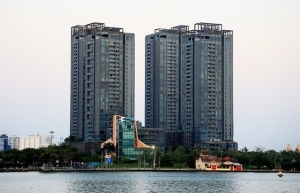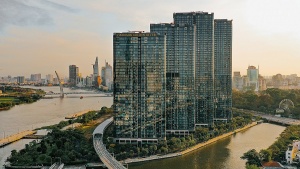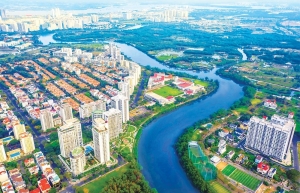Property-related risks in Vietnam decreasing
 |
In 2022, the Vietnamese government began its policy-driven crackdown on financing practices among developers in the real estate market. Two well-known developers were detained, and bond issuing regulations were tightened.
Fitch Ratings generally views the authorities' commitment to combating the emerging property-financing bubble as a positive factor for financial stability, although a lax regulatory approach is likely to have contributed to the prior rise in non-compliant underwriting practices among some developers' bond issuers over 2018–2021.
The aggressiveness of regulatory moves in 2022 crystallised liquidity and credit risks for the property and banking sectors. However, Fitch Ratings believes that, with interest rates having fallen back, the associated stress has peaked and worst-case scenarios that might have seen contingent liabilities migrate to the sovereign balance sheet appear much less likely.
In addition, Vietnam also ran down its official foreign-exchange reserves through 2022, which was largely to alleviate downward pressure on the VND. Reserves dropped from a peak of $112.2 billion in January 2022 to $85.9 billion in November 2022, before recovering slightly into 2023.
The deployment of reserves to smooth market volatility is not problematic in itself. However, Fitch Ratings views reserves as an important protection against the risks posed by external shocks in fast-growing export-oriented economies like Vietnam.
The move has eroded Vietnam’s reserve buffer, which was already small – reserves averaged 3.2 months of current account outgoings over 2018-2022, against the ‘BB’ sovereign median of 5.2 months.
 | Real estate living on borrowed time In the first five months of 2023, 554 realty firms went out of business, up 30.4 per cent year-on-year. Others became worse off as their revenue and profit fell by nearly 7 and 40 per cent, respectively. |
 | Many foreigners continue to buying property in Vietnam According to a report compiled by the Ministry of Construction, a total of 3,197 foreign individuals and 236 foreign entities, have purchased and obtained ownership of residential properties across Vietnam, and the issuing authority continues to grant certification to permitted foreign entities and individuals. |
 | Foreign investors optimistic on added property attraction Vietnam’s property market is still attractive to the foreign community, but it is necessary to continue to improve its legal landscape, information transparency, and data availability to create further enhancements for foreigners to invest. |
What the stars mean:
★ Poor ★ ★ Promising ★★★ Good ★★★★ Very good ★★★★★ Exceptional
 Tag:
Tag:
Related Contents
Latest News
More News
- An Phat 5 Industrial Park targets ESG-driven investors in Hai Phong (January 26, 2026 | 08:30)
- Decree opens incentives for green urban development (January 24, 2026 | 11:18)
- Public investment is reshaping real estate’s role in Vietnam (January 21, 2026 | 10:04)
- Ho Chi Minh City seeks investor to revive Binh Quoi–Thanh Da project (January 19, 2026 | 11:58)
- Sun Group launches construction of Rach Chiec sports complex (January 16, 2026 | 16:17)
- CEO Group breaks ground on first industrial park in Haiphong Free Trade Zone (January 15, 2026 | 15:47)
- BRIGHTPARK Entertainment Complex opens in Ninh Binh (January 12, 2026 | 14:27)
- Ho Chi Minh City's industrial parks top $5.3 billion investment in 2025 (January 06, 2026 | 08:38)
- Why Vietnam must build a global strategy for its construction industry (December 31, 2025 | 18:57)
- Housing operations must be effective (December 29, 2025 | 10:00)






















 Mobile Version
Mobile Version